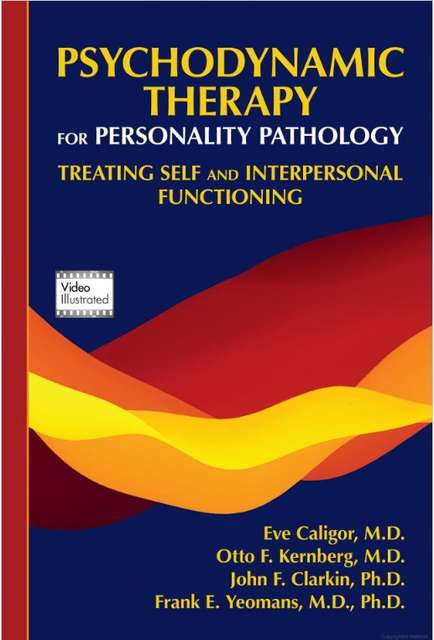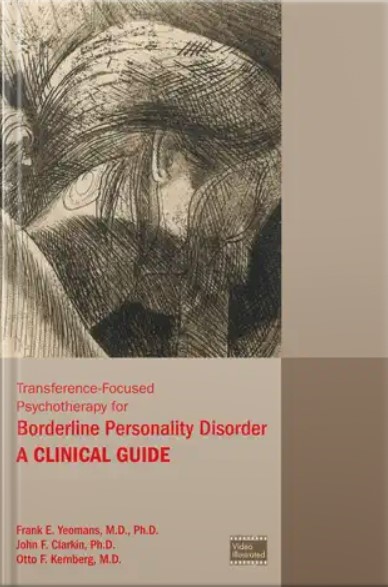Books by Diamond and Yeomans
12:00 AM Jan 25 - 6:00 PM Jan 27, 2024
Transference-Focused Psychotherapy publications
On Friday, January 26 and Saturday, January 27, 2024, Diana Diamond and Frank Yeomans will present on Transference-Focused Psychotherapy. Limited copies of the books listed here are available for purchase.
 Psychodynamic Therapy for Personality Pathology: Treating Self and Interpersonal Functioning, by Frank Yeomans, MD, PhD, Eve Caligor, MD, John F. Clarkin, PhD, is an invaluable resource for any clinician seeking a coherent model of personality functioning and pathology, classification, assessment, and treatment. The work deftly combines theory with clinical practice. This insightful guide introduces Transference-Focused Psychotherapy—Extended (TFP-E), a specialized but accessible approach for any clinician interested in the skillful treatment of personality disorders. Compatible with the DSM-5 Section III Alternative Model for Personality Disorders—and elaborating on that approach, this volume offers clinicians at all levels of experience an accessible framework to guide evaluation and treatment of personality disorders in a broad variety of clinical and research settings. Patient assessment and basic psychodynamic techniques are described in up-to-date, jargon-free terms and richly supported by numerous clinical vignettes, as well as online videos demonstrating interventions. At the end of each chapter, readers will find a summary of key clinical concepts, making this book both a quick reference tool as well as a springboard for continued learning. Clinicians looking for an innovative, trustworthy guide to understanding and treating personality pathology that combines contemporary theory with clinical practice need look no further than Psychodynamic Therapy for Personality Pathology: Treating Self and Interpersonal Functioning.
Psychodynamic Therapy for Personality Pathology: Treating Self and Interpersonal Functioning, by Frank Yeomans, MD, PhD, Eve Caligor, MD, John F. Clarkin, PhD, is an invaluable resource for any clinician seeking a coherent model of personality functioning and pathology, classification, assessment, and treatment. The work deftly combines theory with clinical practice. This insightful guide introduces Transference-Focused Psychotherapy—Extended (TFP-E), a specialized but accessible approach for any clinician interested in the skillful treatment of personality disorders. Compatible with the DSM-5 Section III Alternative Model for Personality Disorders—and elaborating on that approach, this volume offers clinicians at all levels of experience an accessible framework to guide evaluation and treatment of personality disorders in a broad variety of clinical and research settings. Patient assessment and basic psychodynamic techniques are described in up-to-date, jargon-free terms and richly supported by numerous clinical vignettes, as well as online videos demonstrating interventions. At the end of each chapter, readers will find a summary of key clinical concepts, making this book both a quick reference tool as well as a springboard for continued learning. Clinicians looking for an innovative, trustworthy guide to understanding and treating personality pathology that combines contemporary theory with clinical practice need look no further than Psychodynamic Therapy for Personality Pathology: Treating Self and Interpersonal Functioning.
 Transference-Focused Psychotherapy for Borderline Personality Disorder: A Clinical Guide, by Frank Yeomans, MD, PhD, John F. Clarkin, PhD, & Otto F. Kernberg, MD, presents a model of borderline personality disorder (BPD) and its treatment that is based on contemporary psychoanalytic object relations theory as developed by the leading thinker in the field, Otto Kernberg, MD, one of the authors of this insightful manual. The model is supported and enhanced by material on current phenomenological and neurobiological research and is grounded in real-world cases that deftly illustrate principles of intervention in ways that mental health professionals can use with their patients. The book first provides clinicians with a model of borderline pathology that is essential for expert assessment and treatment planning and then addresses the empirical underpinnings and specific therapeutic strategies of transference-focused psychotherapy (TFP). The book recognizes that each BPD patient presents a unique treatment challenge. Grounded in the latest research and rich with clinical insight, Transference-Focused Psychotherapy for Borderline Personality Disorder: A Clinical Guide will prove indispensable to mental health professionals seeking to provide thoughtful, effective care to these patients.
Transference-Focused Psychotherapy for Borderline Personality Disorder: A Clinical Guide, by Frank Yeomans, MD, PhD, John F. Clarkin, PhD, & Otto F. Kernberg, MD, presents a model of borderline personality disorder (BPD) and its treatment that is based on contemporary psychoanalytic object relations theory as developed by the leading thinker in the field, Otto Kernberg, MD, one of the authors of this insightful manual. The model is supported and enhanced by material on current phenomenological and neurobiological research and is grounded in real-world cases that deftly illustrate principles of intervention in ways that mental health professionals can use with their patients. The book first provides clinicians with a model of borderline pathology that is essential for expert assessment and treatment planning and then addresses the empirical underpinnings and specific therapeutic strategies of transference-focused psychotherapy (TFP). The book recognizes that each BPD patient presents a unique treatment challenge. Grounded in the latest research and rich with clinical insight, Transference-Focused Psychotherapy for Borderline Personality Disorder: A Clinical Guide will prove indispensable to mental health professionals seeking to provide thoughtful, effective care to these patients.
 Treating Pathological Narcissism with Transference-Focused Psychotherapy, by Diana Diamond, PhD, Frank Yeomans, MD, PhD, Barry L. Stern, PhD, & Otto F. Kernberg, MD. This book presents a contemporary object relations conceptualization of narcissism and its disorders that integrates psychoanalytic theory with recent developments in neurocognition, social psychology, descriptive psychiatry, and developmental attachment theory—an approach that reflects the work over the past 30 years of the authors colleagues in the Personality Disorders Institute at New York Presbyterian Hospital–Weill Cornell Medical College. It integrates the various theoretical and technical influences, including the neo-Kleinians who have described the psychoanalytic approaches to narcissistic pathology and the unique combination of high-functioning and primitive mental states that characterize them. The book also integrates the attachment theorists who have identified the insecure and disorganized attachment representations that characterize those with pathological narcissism, as well as those who work within the conceptual framework of mentalization who have identified the deficits in imagining and understanding the intentional mental states of self and others and the epistemic hypervigilance that characterize patients with personality disorders. In addition, it includes the contributions of the relational school who have emphasized the unique quality of each patient–therapist dyad and the co-constructed nature of transference and countertransference. Although the book incorporates the work of other theoretical traditions, the approach is most reliant on the work of the North American object relations theorists, particularly co-author Kernberg. This work integrates aspects of ego psychology and contemporary Freudian drive-based perspectives with attachment research and neurobiology that expand the understanding of fundamental motivational systems that contribute to personality functioning and development. The book thus represents the authors collective effort to refine and implement an intensive psychodynamic therapy with a population of patients with a challenging disorder that manifests itself in disparate ways.
Treating Pathological Narcissism with Transference-Focused Psychotherapy, by Diana Diamond, PhD, Frank Yeomans, MD, PhD, Barry L. Stern, PhD, & Otto F. Kernberg, MD. This book presents a contemporary object relations conceptualization of narcissism and its disorders that integrates psychoanalytic theory with recent developments in neurocognition, social psychology, descriptive psychiatry, and developmental attachment theory—an approach that reflects the work over the past 30 years of the authors colleagues in the Personality Disorders Institute at New York Presbyterian Hospital–Weill Cornell Medical College. It integrates the various theoretical and technical influences, including the neo-Kleinians who have described the psychoanalytic approaches to narcissistic pathology and the unique combination of high-functioning and primitive mental states that characterize them. The book also integrates the attachment theorists who have identified the insecure and disorganized attachment representations that characterize those with pathological narcissism, as well as those who work within the conceptual framework of mentalization who have identified the deficits in imagining and understanding the intentional mental states of self and others and the epistemic hypervigilance that characterize patients with personality disorders. In addition, it includes the contributions of the relational school who have emphasized the unique quality of each patient–therapist dyad and the co-constructed nature of transference and countertransference. Although the book incorporates the work of other theoretical traditions, the approach is most reliant on the work of the North American object relations theorists, particularly co-author Kernberg. This work integrates aspects of ego psychology and contemporary Freudian drive-based perspectives with attachment research and neurobiology that expand the understanding of fundamental motivational systems that contribute to personality functioning and development. The book thus represents the authors collective effort to refine and implement an intensive psychodynamic therapy with a population of patients with a challenging disorder that manifests itself in disparate ways.
